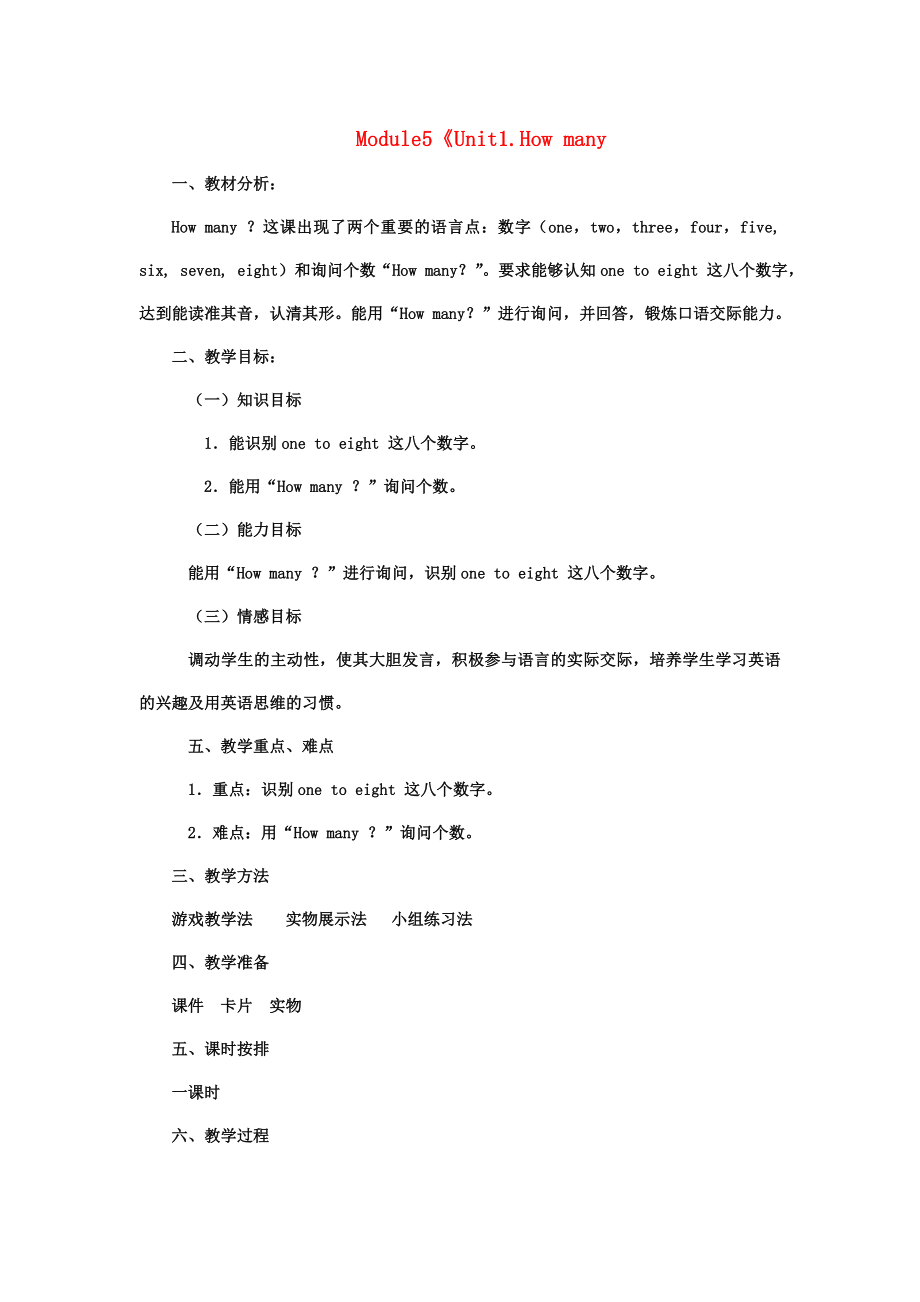《三年級(jí)英語上冊(cè) Unit 1 How many教案 外研版(三起)(通用)》由會(huì)員分享�,可在線閱讀,更多相關(guān)《三年級(jí)英語上冊(cè) Unit 1 How many教案 外研版(三起)(通用)(4頁珍藏版)》請(qǐng)?jiān)谘b配圖網(wǎng)上搜索���。
1�����、Module5《Unit1.How many
一��、教材分析:
How many �?這課出現(xiàn)了兩個(gè)重要的語言點(diǎn):數(shù)字(one���,two��,three�,four,five, six, seven, eight)和詢問個(gè)數(shù)“How many����?”���。要求能夠認(rèn)知one to eight 這八個(gè)數(shù)字����,達(dá)到能讀準(zhǔn)其音���,認(rèn)清其形�����。能用“How many�����?”進(jìn)行詢問�,并回答���,鍛煉口語交際能力�����。
二��、教學(xué)目標(biāo):
(一)知識(shí)目標(biāo)
1.能識(shí)別one to eight 這八個(gè)數(shù)字����。
2.能用“How many ?”詢問個(gè)數(shù)��。
(二)能力目標(biāo)
能用“How many ���?”進(jìn)行詢問�,識(shí)別one to eigh
2�����、t 這八個(gè)數(shù)字����。
(三)情感目標(biāo)
調(diào)動(dòng)學(xué)生的主動(dòng)性,使其大膽發(fā)言�����,積極參與語言的實(shí)際交際,培養(yǎng)學(xué)生學(xué)習(xí)英語的興趣及用英語思維的習(xí)慣���。
五�����、教學(xué)重點(diǎn)、難點(diǎn)
1.重點(diǎn):識(shí)別one to eight 這八個(gè)數(shù)字��。
2.難點(diǎn):用“How many �?”詢問個(gè)數(shù)。
三���、教學(xué)方法
游戲教學(xué)法 實(shí)物展示法 小組練習(xí)法
四��、教學(xué)準(zhǔn)備
課件 卡片 實(shí)物
五�����、課時(shí)按排
一課時(shí)
六���、教學(xué)過程
Step1: Warming up
1.Greetings: “Good morning, boys and girls .I’m Ms Lan.How are you?”
2.
3、Free talk:
走到一名學(xué)生跟前:Hello, What’s your name?
走到另一名學(xué)生跟前:Hi, how are you?
跟學(xué)生隨意交談����,復(fù)習(xí)本學(xué)期學(xué)習(xí)過的句型��。
3.Sing the song 《 please stand up 》.
Sing and do actions.
Step 2: Presentation
1. Teacher shows some objects and say : boys and girls , Ms Lan brings you many things ,Let's see ,what are they?
T says
4��、 :oh, so many ...... How many ? Do you know ? then show word cards, teach “How many”.
T: Today we are going to talk about numbers. 2.( Teacher shows one pen ) and then ask : How many ? Help the students say “one” teacher shows the cards and ask the students to read it in this way “ one ,one, 一 one
5���、”
3.(shows two birds)Ask:How many ? when the teacher says, she must say slowly .Students read after the teacher and learn “ two ”,read it.
T: Let’s count . one two.
T: How many ? 并引導(dǎo)學(xué)生回答:Two.
4.用同樣的方法教學(xué) :“three �、 four .”(Pay attention to the pronunciation of the words “three”
5.Practice “one
6、 to four”.
出示實(shí)物及手指��,問:“How many?”
學(xué)生自己數(shù)并回答��。
6.用同樣的方法教學(xué):“five �、six 、seven �����、eight”.
7.Practice “one to eight”
出示課件圖片�,問:“How many?”
學(xué)生數(shù)并回答。
8.Write. write “one to eight”on the exercise book.
Step 3. Text
T:今天我們的老朋友Panpan要為我們變魔術(shù)了�,他要為我們變一些可愛的小兔子,到底變了多少個(gè)���,讓我們一起來數(shù)數(shù)�����。(出示課件�����,跟學(xué)生一起數(shù))�����。
Step 4. Practice
7�����、and game
1.Put the numbers cards stick on the blackboard and teacher points to the numbers randomly on the board .and the students to speak them out.
2.Say and point .
Ask a student to say: “Point to three” ,another stuent do the action.
3.I can say the numbers.
課件出示一組數(shù)字����,請(qǐng)同學(xué)們用英語說出這些數(shù)字�。
114
8、752 254 125 416 214 682 985
課件出示一組電話號(hào)碼����,請(qǐng)同學(xué)用英語說出這組數(shù)字�。并給予獎(jiǎng)勵(lì)�����。
4.Say a chant :
How many? How many? One.one.one.
How many? How many? Two.two.two.
How many? How many? Three.three.three.
How many? How many? Four.four.four..
How many? How many? Five .five.five..
How many? How many? Six.si
9�����、x.six..
How many? How many? Seven.seven.seven..
How many? How many? Eight.eight.eight.
Step 5.課堂小結(jié)
本節(jié)課我們學(xué)習(xí)了如何使用英語述說數(shù)字1-8����,那么如何詢問數(shù)字的多少呢?
Step 6 Homework .
. 1.Count from one to eight.(從一數(shù)到八)
2.Tell your parents to learn some photos and so on.( 讓學(xué)生用英文告訴家長自己家和朋友家的電話號(hào)碼��、車牌號(hào)碼等��。)
課后反思:
整個(gè)學(xué)習(xí)過程中���,學(xué)生一
10���、直處于積極主動(dòng)的學(xué)習(xí)狀態(tài)。學(xué)生與學(xué)生之間�,老師與學(xué)生之間始終處于互動(dòng)狀態(tài)。在教學(xué)過程中��,我注重對(duì)學(xué)生學(xué)法進(jìn)行的引導(dǎo),幫助他們初步掌握學(xué)習(xí)方法�,使他們“善學(xué)”“樂學(xué)”“會(huì)學(xué)”。設(shè)計(jì)了“report homework”布置作業(yè)方式���,調(diào)動(dòng)了學(xué)生的課堂學(xué)習(xí)的積極性,和培養(yǎng)了學(xué)生交流合作��,互幫互助上好課����,提高聽課效率的聽課的學(xué)習(xí)習(xí)慣�����。
教學(xué)中�,我將游戲���、歌曲等通過現(xiàn)代信息技術(shù)融串于整個(gè)教學(xué)過程�。設(shè)計(jì)了3個(gè)游戲讓學(xué)生進(jìn)行交際性操練����,并進(jìn)行有效的示范,使游戲開展自如流暢���,操練多樣化�����。讓學(xué)生在完全放松的狀態(tài)中去接觸�、學(xué)習(xí)英語,真正做到在玩中學(xué)�,學(xué)中玩。學(xué)生能夠積極地參與游戲�����,課堂氣氛活躍���,凸顯學(xué)生的主體地位�����。把“任務(wù)型教學(xué)法”�、“情境教學(xué)法”和“游戲教學(xué)法”結(jié)合起來貫穿整個(gè)教學(xué)�����,充分體現(xiàn)學(xué)生的主體地位�,有效地培養(yǎng)學(xué)生學(xué)習(xí)英語的興趣和創(chuàng)新思維��。
但還有很多不足之處:1:新詞授完后�����,應(yīng)整體再鞏固一遍����,使學(xué)生牢固掌握��。2:對(duì)學(xué)生的書寫要進(jìn)行展示���、評(píng)價(jià)��。3:應(yīng)在課前仔細(xì)檢查課件��,不應(yīng)該出現(xiàn)錯(cuò)誤��。4:應(yīng)及時(shí)糾正學(xué)生對(duì)字母:“V”“U”的認(rèn)讀。
 三年級(jí)英語上冊(cè) Unit 1 How many教案 外研版(三起)(通用)
三年級(jí)英語上冊(cè) Unit 1 How many教案 外研版(三起)(通用)

